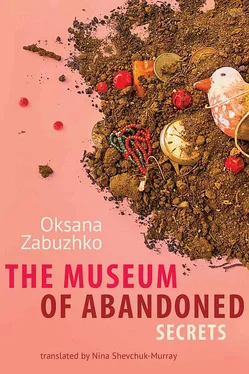That’s why, when a month or so after our interview she complained to me of not being able to sleep—and she so rarely complained about anything, and always only in the past tense, after whatever difficulty had vexed her had been overcome, the barrier cleared, and the effort involved reduced to a source of comforting insight for a friend in need, as in “I know exactly what you’re dealing with, I’ve gone through the same thing, but see, I made it, and so will you”—I simply missed the alarm, failed to receive the signal, or, more precisely, ignored it like background noise: such signals, apparently, are only recognized by cretins like myself in deep hindsight, after the funeral, when all the heaving and sighing and shaking of heads adds up to a critical mass and reveals that such signals fell around the deceased in her last weeks like hail. How could we all have missed them, under what collective curse?
“Would you believe it, I can’t sleep,” she’d said on the phone, as if extending an invitation to marvel together at this unusual phenomenon, but at two in the morning the tireless gurgle of her voice bore into my ear like a subcutaneous irritation because I had to get up at six for a live session and was close to falling over as I moved around my apartment, bumping into furniture, half-aware of packing my bag, with the phone against my ear that seemed to be slowly mashed into a bloody mess as she dripped, “I have this idiotic fear, like, if I fall asleep, I will die….”
“Vlada, you’re simply overworked,” I said, for the sixth time in the last hour, “nothing comes without a price; you’ve had a hard year, leave it all and go on vacation somewhere far away”—thinking that the newly elected representative also needed some resting, since apparently he had no way of helping a woman fall asleep and was turning into one of his brethren who get from stress to stress by drinking their way through a sea of alcohol, only to be diagnosed with erectile dysfunction by age forty—and Vlada was still babbling, unflinchingly, that yes, I had a point, and they were already planning a trip to Dubai, or Abu Dhabi, one is cheaper and the other more accommodating, and which one she’d recommend in case I decided to get away, finally, too, until I had to plead for mercy and howled, “Vlada Matusevych, would you please shut up and let me get away for the four hours I still have?!”
She laughed—a short, erratic flute scale, strangely melodic but suddenly awkward, as if she just then realized that she’d been keeping me up, and unsettling, too, because I also felt awkward for having flaunted my sleepiness to a friend suffering from insomnia—and it felt like I’d left her to fend for herself at night in an unfamiliar place. The laugh stuck in my ear like water, except that it did not, like water, seep warmly into the pillow as I slept through the short hours, and I woke still hearing its silvery echo, which, should I have had the wits to stop and listen to carefully, would have spelled out another warning signal—a sign that my outburst, which had slipped out of my grip like an ax falling from tired arms, had cut an invisible cable from the great edifice that is life, and it shuddered in response. In Vlada’s tinny laugh, high like a taut string’s ear-splitting response to an errant touch, razor on glass—that’s the dissonance that the four hours I still had must have sent into the widening, humming circles of infrasound vibrations that were already swirling around Vlada, because the truth was that at that point, I had many more hours left than she had; hers were countable, hers were slipping away, hers were almost drained to the bottom, but neither of us could have known it then.
And three weeks after that she did fall asleep—precisely as her late-night fear warned her not to—in the middle of the day, in her car, on the highway to Boryspil, on her way to meet her agent who was flying in from Frankfurt with her paintings; he insisted he’d given them to her and they parted at the airport; but when Vlada’s overturned Beetle, crumpled like a tin can around her body, which was speared, hard, by the steering wheel, was lifted from the ditch and cut apart, there were no paintings in it, neither in the back seat, nor in the trunk, and, of course, one could assume that the car was robbed after it had crashed, or one could indulge a swarm of far worse and entirely outlandish suspicions about the accident, of which the only one that retained any vestiges of common sense, and thus could keep the living from losing all of theirs, was the idea that Vlada had fallen asleep while driving and the car had swerved off the wet highway (it had been raining just before the accident), and no one would ever know—this haunted me for a long time afterward—whether in the last split second before impact, as the Beetle flew into the ditch, Vlada was shaken awake in time to realize what was happening (Long enough to be terrified? To scream? To feel the pain? To hear the sound of her own bones crushing?) or if she’d woken up already on the other side, trying, unsuccessfully, to rub her eyes and slowly coming to realize that she no longer had eyes nor hands to rub them with. (This would be better—so much better that I spent many months convincing myself that that’s exactly what happened.)
“I killed her,” repeated Rep. Vadym, face frozen into a bizarre half-smile, as he sank, fat and red (Vlada, small as Thumbelina, had always preferred large-scale men), into the ottoman; his shirt had come undone and a patch of high-quality underwear stuck out; a bottle of Courvoisier stood on the rug at his feet, and he held his glass with both hands, mechanically swirling his drink and repeating his mantra—“I killed her, I killed her, it’s my fault, I should have been in that car”—and this grotesque teddy-bearishness of his was the hardest to take, especially when paired with what he was saying, so inconsistent with reality, so discordant with what had happened—like the sound a razor blade makes on glass—as if he’d been cut and pasted here from a different movie altogether. I thought he was beating himself up for having let Vlada go alone, that he was crushed with the desperate realization that if he’d gone with her, she would’ve lived—and it was hard to argue with that—but it dawned on me that he was not feeling guilty about Vlada so much as feeling sorry for himself. It took all I had not to scream at him, Shut up!, even though he was not really speaking to me, or asking anything of me, and would’ve been asking the same question if I weren’t there, would ask his drink, and the ottoman on which he sat: “Dear Lord, how am I supposed to go on living?” And then with a precision amazing for his size, he put the glass down on a coaster and hid his face with his hands, half-moaning and half-mumbling something completely incomprehensible and leaving me to stand there helplessly and stare at his fingers splayed against his baby-pink bald head like a bunch of sausages.
It wasn’t duty that brought me speeding to his damn nouveauriche apartment on Tarasivska—just finished, with a penthouse, and a glass roof—I hadn’t come to comfort him or to meld with him in shared grief; there was something else I wanted: I was watching him like a slowly darkening mirror that still held Vlada’s image, to find on him still-warm bits of her presence from the day before and pick them off him, like lint, to see him—as I realized I’d begun to do—with her eyes, something I’d never done before, when he was just a boyfriend (that’s how Vlada referred to him, always in English), not her lover, not her man, her boyfriend; that’s why, on some level, my mind put check marks of approval against his underwear, and the unexpected delicacy of his movement as he put the glass down—a quick aha , so these paws with sausages for fingers know how to be sensitive—and noted also his dry eyes—Vadym poured much more into himself than he let out, a sign of healthy virile appetites, of a vigorous bladder and other organs (once, when the two of them came over, we spent five hours sipping Courvoisier, but he never once got up to go to the bathroom; Vlada always said they had a great physical relationship, she wouldn’t have said anything if it weren’t so, so her insomnia had nothing to do with that). But it wasn’t like I’d run there to appraise him for an auction and grade his condition either; these things flashed in my mind at random, in double-exposure, I felt neither distaste nor sympathy for this man, and when I told him it was not his fault, I did so not because I felt sorry for him but solely out of respect for Vlada’s death, which belonged to her and her alone, and must have been woven according to the unique design of her lifetime. As for Vadym, I instantly and irretrievably cast him the role of the banana peel on which people in old movies slip at fateful moments and crash to their deaths, but real life, unlike movies, sets up its fateful moment long before any banana peels make themselves available, and that’s why Vadym’s mechanical screeching—I killed her, I killed her—was irksome and offensive: it disgraced my proud and independent Vlada by claiming agency in her life, it reeked of yellowish newspaper clippings, which were, no doubt, to appear very soon, scandal-mongering vultures must’ve caught the whiff of offal already and begun circling around the house, tomorrow there’d be flocks of them, see if you can hide from the flashes then—but this was also something one had to survive one way or another, and it would all happen later, in the noxious weeks when her death would be deboned, quartered, and roasted with different sauces in a breathless recipe contest broadcast to every household in the nation, until the thing got so frayed and worn that even my heart stopped seizing every time I saw her portrait and the portraits became just pictures of a famous person, an entry in a Who’s Who .
Читать дальше












